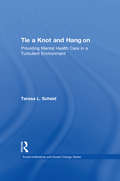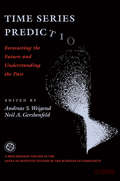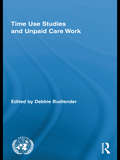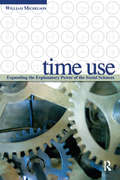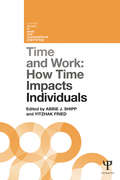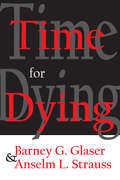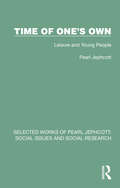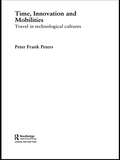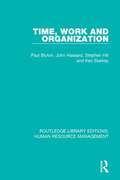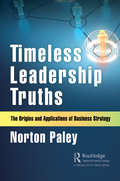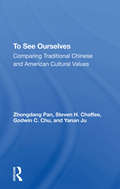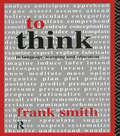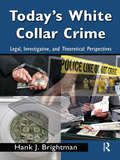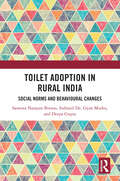- Table View
- List View
Tibet in Exile: Politics, Psychology and Culture of the Tibetan Diaspora
by Shalini MittalThis book delves deep into the lived experiences of the Tibetan diaspora, offering an insightful exploration through the intersecting lenses of politics, psychology, and culture. Drawing from the expertise of scholars in fields such as political science, sociology, psychology, and cultural studies, the book provides a rich, multidisciplinary analysis that reveals the complexities of Tibetan life in exile. It meticulously examines the delicate diplomacy between the Tibetan government-in-exile and host nations, unraveling the intricate political dynamics that shape the aspirations and challenges faced by Tibetans abroad. In addition to political analysis, the book sheds light on the psychological resilience and cultural innovation within the Tibetan community. Through an exploration of art, music, literature, and religious practices, it uncovers how Tibetans have creatively reimagined and redefined their cultural identity in the face of displacement and adversity. This volume is an essential resource for students, researchers, and educators in anthropology, political science, sociology, psychology, and cultural studies. It also serves as a valuable tool for policymakers, advocates, and activists engaged in issues of diaspora, migration, human rights, and social justice. For anyone seeking to understand the profound impact of exile, the endurance of cultural identity, and the strength of community, this book is a must-read. This version aims to be more engaging while clearly defining the book’s scope, relevance, and target audience.
Tie a Knot and Hang on: Providing Mental Health Care in a Turbulent Environment
by Teresa ScheidTie a Knot and Hang On is an analysis of mental health care work that crosses the borders of diverse sociological traditions. The work seeks to understand the theoretical and empirical linkages between environmental pressures and activities and how these intersect with organizations and individuals. The work draws upon a research tradition that sees the issue of mental health care in terms of institutional pressures and normative values. The author provides a description and a sociological analysis of mental health care work, emphasizing the interaction of professionally generated norms that guide the "emotional labor" of mental health care workers, and the organizational contexts within which mental health care is provided. She concludes with a discussion of emerging institutional forces that will shape the mental health care system in the future. These forces are having greater impact than ever before as managed care comes to have a huge fiscal as well as institutional impact on the work of mental health professionals. Scheid's book is a brilliant, nuanced effort to explain the institutional demands for efficiency and cost containment with the professional ethics that emphasize quality care for the individual. The book is essential reading for those interested in mental health care organizations and the providers responding to these seemingly larger, abstract demands. The work offers a rich mixture not just of the problems faced by mental health care personnel, but the equilibrium currently in place u an equilibrium that shapes the theory of the field, no less than the activities of its practitioners. Teresa L. Scheid is associate professor of sociology, at the University of North Carolina at Charlotte. She has published widely in the area, including major essays in Sociology of Health and Illness, Sociological Quarterly, Perspectives on Social Problems, and The Journal of Applied Behavioral Science.
Time Series Prediction: Forecasting The Future And Understanding The Past
by Andreas S. WeigendThe book is a summary of a time series forecasting competition that was held a number of years ago. It aims to provide a snapshot of the range of new techniques that are used to study time series, both as a reference for experts and as a guide for novices.
Time Use Studies and Unpaid Care Work (Routledge/UNRISD Research in Gender and Development)
by Debbie BudlenderAcross the world, unpaid care work - unpaid housework, care of persons, and "volunteer" work - is done predominantly by women. This book presents and compares unpaid care work patterns in seven different countries. It analyzes data drawn from large-scale time use surveys carried out under the auspices of the United Nations Research Institute for Social Development (UNRISD). With its in-depth concentration on time use patterns in developing nations, this book will offer many new insights for scholars of gender and care.
Time Use: Expanding Explanation in the Social Sciences
by William H. MichelsonMany researchers have studied people's everyday use of time. National and international agencies increasingly collect and analyze time-use data. Yet this perspective and its techniques remain a black box to most social science researchers and applied practitioners, and the potential of time-use data to expand explanation in the social sciences is not fully recognized by even most time-use researchers. Sociologist William Michelson's unique book places the study of time-use data in perspective, demystifies its collection and analytic options, and carefully examines the potential of time-use analysis for a wide range of benefits to the social sciences. These include the sampling of otherwise socially "hidden" groups, bridging the gap between qualitative and quantitative phenomena, gender studies, family dynamics, multitasking, social networks, built environments, and risk exposure.
Time and Intimacy: A New Science of Personal Relationships (LEA's Series on Personal Relationships)
by Joel B. BennettThere is a mysterious connection between our experiences of intimacy--of love, the longing to feel connected, and sexual embrace--and the human sense of time--eternity, impermanence, and rhythm. In this critical analysis of the time-intimacy equation, Bennett shows how the scientific study of personal relationships can address this mystery. As a study of transpersonal science, this book points to the possible evolution of intimacy and of our consciousness of time, and how the two evolutionary paths weave together. Dr. Bennett draws from a wide array of resources to advance and marry two compelling themes: first, the social and clinical science of personal relationships should integrate the spiritual or transpersonal dimension of intimacy, and second, science can contribute to lay understandings by describing the richly temporal aspects of relationships. In blending popular literature, transpersonal psychology, and scientific research and theory, this work also attempts to address the lack of dialogue between academics who study personal intimacy and those writers in the popular press who give advice and guidelines for building intimacy. Time and Intimacy is written for a broad audience, intended for those with a general interest in relationships, as well as for students, counselors, and psychologists. It can be used as a text in courses on personal relationships, as well as to supplement courses in humanistic psychology, transpersonal psychology, interpersonal communication, relationships, marital and family counseling, human relations, and related areas. Because it advances an interdisciplinary understanding of personal relationships, this book is certain to challenge prevailing views about the meaning of intimacy in both the academic and popular literatures.
Time and Temporality in Transitional and Post-Conflict Societies (Routledge Advances in Sociology)
by Natascha Mueller-Hirth Sandra Rios OyolaImplicit conceptions of time associated with progress and linearity have influenced scholars and practitioners in the fields of transitional justice and peacebuilding, but time and temporality have rarely been systematically considered. Time and Temporality in Transitional and Post-Conflict Societies examines how time is experienced, constructed and used in transitional and post-conflict societies. This collection critically questions linear, transitional justice time and highlights the different temporalities that exist at local and institutional levels through original empirical research. Presenting empirical and often ethnographic research from Argentina, Brazil, Colombia, Cambodia, Mozambique, Palestine/Israel, Rwanda and South Africa, contributors use a temporal lens to investigate key issues including: transitional justice institutions, peace processes, victimhood, perpetrators, accountability, reparations, forgiveness, reconciliation and memoralisation. This timely monograph will appeal to undergraduate and postgraduate students, as well as postdoctoral researchers, interested in fields such as political science, international relations, anthropology, transitional justice and conflict resolution. It will also be relevant to conflict resolution and peacebuilding practitioners.
Time and Work, Volume 1: How time impacts individuals
by Abbie J. Shipp Yitzhak FriedThe concept of time is a crucial filter through which we understand any events or phenomena; nothing exists outside of time. It conditions not only the question of ‘when’, but also influences the ‘what, how and why’ of our ideas about management. And yet management scholars have rarely considered this ‘temporal lens’ in understanding how time affects employees at work, or the organizations for which they work. This 2-volume set provides a fresh, temporal perspective on some of the most important and thriving areas in management research today. Volume 1 considers how time impacts the individual, and includes chapters on identity, emotion, motivation, stress and creativity. Volume 2 considers time in context with the organization, exploring a temporal understanding of leadership, HRM, entrepreneurship, teams and cross-cultural issues. There is an overall concern with the practical implications of understanding individuals and organizations within the most relevant timeframes, while the two volumes provide an actionable research agenda for the future. This is a highly significant contribution to management theory and research, and will be important reading for all students and researchers of Organizational Behavior, Organizational Psychology, Occupational Psychology, Business and Management and HRM.
Time and Work, Volume 2: How time impacts groups, organizations and methodological choices
by Abbie J. Shipp Yitzhak FriedThe concept of time is a crucial filter through which we understand any events or phenomena; nothing exists outside of time. It conditions not only the question of ‘when’, but also influences the ‘what, how and why’of our ideas about management. And yet management scholars have rarely considered this ‘temporal lens’ in understanding how time affects employees at work, or the organizations for which they work. This 2-volume set provides a fresh, temporal perspective on some of the most important and thriving areas in management research today. Volume 1 considers how time impacts the individual, and includes chapters on identity, emotion, motivation, stress and creativity. Volume 2 considers time in context with the organization, exploring a temporal understanding of leadership, HRM, entrepreneurship, teams and cross-cultural issues. There is an overall concern with the practical implications of understanding individuals and organizations within the most relevant timeframes, while the two volumes provide an actionable research agenda for the future. This is a highly significant contribution to management theory and research, and will be important reading for all students and researchers of Organizational Behavior, Organizational Psychology, Occupational Psychology, Business and Management and HRM.
Time and the Rhythms of Emancipatory Education: Rethinking the temporal complexity of self and society (Theorizing Education)
by Michel Alhadeff-JonesTime and the Rhythms of Emancipatory Education argues that by rethinking the way we relate to time, we can fundamentally rethink the way we conceive education. Beyond the contemporary rhetoric of acceleration, speed, urgency or slowness, this book provides an epistemological, historical and theoretical framework that will serve as a comprehensive resource for critical reflection on the relationship between the experience of time and emancipatory education. Drawing upon time and rhythm studies, complexity theories and educational research, Alhadeff-Jones reflects upon the temporal and rhythmic dimensions of education in order to (re)theorize and address current societal and educational challenges. The book is divided into three parts. The first begins by discussing the specificities inherent to the study of time in educational sciences. The second contextualizes the evolution of temporal constraints that determine the ways education is institutionalized, organized, and experienced. The third and final part questions the meanings of emancipatory education in a context of temporal alienation. This is the first book to provide a broad overview of European and North-American theories that inform both the ideas of time and rhythm in educational sciences, from school instruction, curriculum design and arts education, to vocational training, lifelong learning and educational policies. It will be of key interest to academics, researchers and postgraduate students in the fields of philosophy of education, sociology of education, history of education, psychology, curriculum and learning theory, and adult education.
Time for Dying
by Graham McAleerThis book has been written for those who must work with and give care to the dying. Our discussion is not simple narrative or description; it is a ""rendition of reality,"" informed by a rather densely woven and fairly abstract theoretical scheme. This scheme evolved gradually during the course of our research. The second audience for this volume is social scientists who are less interested in dying than they are in useful substantive theory. Our central concern is with the temporal aspects of work. The theory presented here may be useful to social scientists interested in areas far removed from health, medicine, or hospitals. The training of physicians and nurses equips them for the technical aspects of dealing with illness.Medical students learn not to kill patients through error, and to save lives through diagnosis and treatment. But their teachers put little or no emphasis on how to talk with dying patients; how-or whether-to disclose an impending death; or even how to approach the subject with the wives, husbands, children, and parents of the dying. Students of nursing are taught how to give nursing care to terminal patients, as well as how to give ""post-mortem care."" But the psychological aspects of dealing with the dying and their families are virtually absent from training. Although physicians and nurses are highly skilled at handling the bodies of terminal patients, their behavior to them otherwise is actually outside the province of professional standards. Much, if not most, nontechnical conduct toward, and in the presence of, dying patients and their families is profoundly influenced by ""common sense"" assumptions, essentially untouched by professional or even rational considerations or by current advancement in social-psychological knowledge. The process of dying in hospitals is much affected by professional training and codes, and by the particular conditions of work generated by hospitals as places of work. A third important consideration in int
Time in Organizational Research (Routledge Studies in Management, Organizations and Society)
by Stewart R. Clegg Robert A. Roe Mary J. WallerToday there is widespread awareness of the fact that time has been under-investigated in organizational studies. This book addresses the need to bridge the gap between the predominantly "timeless" theories and models that scholars have produced and the daily experiences of employees and managers, in which time is salient and extremely important. These chapters offer a broad range of concepts, models, and methods that are tailored to this purpose. The first part of the book is devoted to the way in which people in organizations manage time, summarizing research findings, presenting novel ideas on a broad range of issues and examining issues such as whether time can be managed, how people are affected by deadlines and how do strategic changes in organizations affect individuals’ careers and sense of identity. The second part is about time as embedded in collective behaviours and experiences, and in temporal regimes linked to organizational structures. It discusses ways to study such collective patterns and their relationships to management practices, and addresses topics such as sensemaking of dynamic events, rhythmic patterns and their impact on organizational effectiveness, time in industrial relations, and power and temporal hegemony. A third part with a single concluding chapter looks at possibilities for integrating the various approaches and provides suggestions for future research. This book adopts a pluralistic approach, arguing against timeless conceptions in organizational theory and behaviour and instead emphasising the importance of temporal analysis.
Time of One's Own: Leisure and Young People (Selected Works of Pearl Jephcott: Social Issues and Social Research)
by Pearl JephcottOriginally published in 1967, Time of One’s Own asks the question: How do young Scots spend their free time nowadays? The Kilbrandon Council asked the University of Glasgow to undertake a study on this subject and their conclusions form the subject of this book. ‘Young Scots’ were confined to those aged fifteen to nineteen, and in the main to those living in three localities which it was hoped were reasonably typical – a mining town in West Lothian and, in Glasgow, an old inner area and a new outlying housing estate. Some three thousand boys and girls provided facts and views. In addition to statistical material the study constantly refers to the ‘how and why’ of the way in which the individual youngster spent their free time. The adults who collected the information agreed that what they saw of the leisure of these adolescents lacked variety and sparkle. On the other hand, a considerable proportion of the boys and girls appeared to be on the brink of using it in less stereotyped ways. Just a little push might have done the trick. In general, the provision for recreation was inadequate. This was especially so in the case of indoor facilities. The Youth Service, which should play so important a role, required far more support. This is a valuable record from the time of what it was like to have ‘Time of One’s Own’, and this reissue is a fascinating addition to all those interested in the history of Education and Sociology.
Time, Innovation and Mobilities: Travels in Technological Cultures (International Library of Sociology)
by Peter Frank PetersIn social theory and sociology, time and travel in technological cultures is one of the new and challenging research topics in the 'mobilities turn'. Yet surprisingly, contemporary practices of mobility have till now, seen only limited theorization within these disciplines. By analyzing historic and contextualized transit practices, this revealing book argues that travel cannot now simply be reduced to getting from A to B; it is an integrated part of everyday life. In this area, researching how problems can be identified as dilemmas and reformulated as design problems helps create a new vocabulary; one which will not only change the agenda in the debate on mobility problems in the public domain, but will also suggest new ways of theorizing mobility innovations. In this fascinating book, author Peters: develops a conceptual framework to study contemporary transit practices and evaluate innovation strategies gives new insights regarding historic and contemporary design strategies and regarding innovations related to travel in technological cultures gives special attention to electronic timespaces and ICT based mobility innovations investigates cases of travel in technological cultures, car travel, air travel, and cycling in Dutch towns. An original and provocative contribution to the emerging field of mobilities, this book will become an essential resource for advanced undergraduate, post-graduate, researchers and practitioners in the fields of sociology, geography, spatial planning, policy and transportation studies.
Time, Leisure and Well-Being (Routledge Critical Leisure Studies)
by Jiri ZuzanekThe significance of work and leisure as elements of our social fabric have puzzled philosophers and social scientists for generations. This ambitious new study considers historical views of work and leisure alongside contemporary survey evidence about time-use and well-being. Combining sophisticated theoretical analysis with empirical research, the book presents a contrarian argument that defines leisure as a serious and stimulating challenge rather than an unqualified benefit or good. This is vital reading for anyone with an interest in the concept of time in the social sciences, work-life balance, organisational studies, or the history, philosophy, or sociology of work and leisure.
Time, Work and Organization (Routledge Library Editions: Human Resource Management)
by John Hassard Paul Blyton Stephen Hill Ken StarkeyIn this book, first published in 1989, the authors have sought to highlight some of the major themes in the study of time and work within separate but related fields of study. A number of common starting points and issues are examined, alongside the various conclusions which different researchers have drawn together. Working together, the four authors have enriched their individual understanding of worktime through exposure to approaches taken by others working within different discipline boundaries. This title will be of interest to students of business studies.
Time-Marching: A Step-by-step Guide to a Flow Solver (Routledge Revivals)
by Michael LoboFirst published in 1997, this volume recognises that there are, at present, few if any books on existing CFD codes that are accessible to the academic world in general. And yet such works are of extreme importance if one is to bridge the gap between a CFD course for postgraduate students and the frontiers of current research. This book is especially intended for students commencing research in CFD – taking them step-by-step through the mathematical development of a flow solver.The only pre-requisite to an understanding of this work is a sound knowledge of engineering mathematics. Starting from the governing equations, the author explains the theory behind the time-marching approach and proceeds step-by-step to a complete computer program for the Euler solver in two dimensions. The present work is restricted to two dimensions because in the first instance ideas can be assimilated much more easily in the context of two dimensions.The book is written for research students and users of CFD. The material may be of interest even to those not directly involved with time-marching solvers, and the presentation is simple enough to be followed by course students.
Timeless Leadership Truths: The Origins and Applications of Business Strategy
by Norton PaleyThe origins of business strategy are found in military applications. Generals throughout history faced formidable challenges as they crafted plans to outmaneuver competing forces, acquire territory, and gain power. Similarly, business leaders also look to outmaneuver their rivals as they enter new markets against entrenched competitors, secure a strong market position, and expand their companies’ influence. Although the destructive aspects of war are not present in business, there is a reasonable parallel, such as the bankruptcies of once-mighty companies, which resulted in layoffs of thousands of employees and the closings of numerous plants. Then there was the devastating economic impact and societal disruption that created demoralizing misery among large groups of individuals in once-flourishing areas worldwide. The intent of the book is to improve managers’ ability to think strategically. The further aim is to blend the timeless lessons of military strategy into business plans, with impact in grassroots engagement with customers, as well as the inevitable clashes with competitors. In addition, readers can access a body of knowledge that has endured in written form and practiced by successful leaders for centuries. As such, managers will hold a competitive edge in an evolving digital-age marketplace.
Title I: Compensatory Education at the Crossroads (Sociocultural, Political, and Historical Studies in Education)
by Robert E. Slavin Samuel C. Stringfield Geoffrey D. BormanThe authors present evidence and theory that explain the positive trend for Title I effects and the recent leveling of this trend in program outcomes. They document the finding that Title I has had a modest positive impact on student achievement.
To Dance the Dance: A Symbolic Interactional Exploration of Premarital Sexuality (LEA's Series on Personal Relationships)
by F. Scott ChristopherThis pioneering monograph integrates the major research findings of the past four decades and offers a new model for the study of human sexuality. The author examines the empirical literature on sexuality for the developmental stages of childhood, adolescence, and young adulthood and for experiences of sexual aggression. He then uses symbolic interactionism to develop a theoretical model which integrates the research across the developmental periods and for instances of sexual aggression, providing one of the most comprehensive views of sexuality development that has yet been offered. The work investigates the role of family, peers, romantic partners, and personality in the development of sexual expression and offers a unique vision of how symbolic interactionism can inform one's understanding of sexual beliefs and behaviors through the developmental stages. By acknowledging developmental differences and changes in individuals and their interpersonal relationship context, a more integrated understanding emerges of how sexuality develops. This volume is intended for students and scholars interested in the influences on the development of sexual expression of youth and young adults. It will be of great interest to readers in psychology, family studies, communication, sociology, adolescent studies, and specialized areas of sexuality research. It is appropriate for undergraduate seminars and graduate-level courses on human sexuality, close relationships, family theory, sociology, communication, social psychology, developmental psychology, and related areas.
To Heal Humankind: The Right to Health in History
by Adam GaffneyThe "human right to healthcare" has had a remarkable rise. It is found in numerous international treaties and national constitutions, it is litigated in courtrooms across the globe, it is increasingly the subject of study by scholars across a range of disciplines, and—perhaps most importantly—it serves as an inspiring rallying cry for health justice activists throughout the world. However, though increasingly accepted as a principle, the historical roots of this right remain largely unexplored. To Heal Humankind: The Right to Health in History fills that gap, combining a sweeping historical scope and interdisciplinary synthesis. Beginning with the Age of Antiquity and extending to the Age of Trump, it analyzes how healthcare has been conceived and provided as both a right and a commodity over time and space, examining the key historical and political junctures when the right to healthcare was widened or diminished in nations around the globe. To Heal Humankind will prove indispensable for all those interested in human rights, the history of public health, and the future of healthcare.
To See Ourselves: Comparing Traditional Chinese And American Values
by Zhongdang Pan Steven H Chaffee Godwin C Chu Yanan JuThis study compares the ever-changing cultural values of contemporary China and the contemporary United States. Surveying 2000-Shanghi area residents and villagers as well as 2500 US citizens, the authors examine to what extent there has been a loss of "traditional" values in the United States. The book looks at value systems in both cultures associated with family relationships, kinship ties, male-female relationships, and general interpersonal relationships - the fundamental social relationships comprising the social fabric of a society. The authors conclude that although both societies have experienced changes in this century, they have followed quite different paths. In exploring the extent to which this process has differed, the authors address the following questions: what traditional Confucian values persist in China after 40 years of communist indoctrination and the recent "invasion" of Western culture? How are fundamental human relationships viewed in the United States? How do these two societies differ today, both in adherence to traditional values and in the dynamics of value change? These and many more issues are explored.
To Think: In Language, Learning and Education
by Frank SmithFirst Published in 1992. Routledge is an imprint of Taylor & Francis, an informa company.
Today's White Collar Crime: Legal, Investigative, and Theoretical Perspectives (Criminology and Justice Studies)
by Hank J. BrightmanWritten as a text for undergraduate courses, this book appeals to instructors interested in teaching the field of white-collar crime, both from a matter-of-fact investigative perspective as well as a decidedly academic endeavor. Accordingly, it goes beyond discussing the basic theories and typologies of commonly-encountered offenses such as fraud, forgery, embezzlement, and currency counterfeiting, to include the legalistic aspects of white-collar crime. It also explores the investigative tools and analytical techniques needed if students wish to pursue careers in this field. Because of the inextricable links between abuse-of-trust crimes such as misuse of government office, nepotism, and bribery and the realm of corporate corruption, these issues are also included. The text also maintains a connection between white-collar crime and acts of international terrorism; as well as the more controversial aspects of possible abuses of power within the public arena posed by the USA Patriot Act of 2001 and the asset forfeiture process. Adapted readings at the end of each chapter provide readable cases of white collar crime in action to illustrate the principles / theories presented. Activities, Exercises, and Photographs are also included in each of the 10 chapters and a Companion Web Site provides additional test items and other instructor support material.
Toilet Adoption in Rural India: Social Norms and Behavioural Changes
by Indranil De Saswata Biswas Gyan Mudra Deepa GuptaThis book examines sanitation and toilet access across rural India, focusing on psychological, socio-cultural, infrastructural, and normative barriers to the initiative of Swachh Bharat Mission (SBM). While sketching the evolution of sanitation policies in India, it assesses their impact on sanitation behaviour. It also studies the implications of variations in caste, religion, and geography on toilet usage across Indian states.By analysing data from various states and intensive micro-level studies of three states, i.e., rural Bihar, Gujarat, and Telangana, this volume: Suggests that socio-cultural factors are as significant as economic factors in shaping sanitation behaviour; Argues that the concepts of cleanliness and pollution are often determined by the social-cultural context, rooted in historical events that have shaped traditional beliefs and ideas about space; Explores gendered perspectives on the usage of and access to toilets; Highlights the limited effectiveness of Information, Education, and Communication (IEC) programs in encouraging toilet adoption and emphasizes the need for information dissemination at the ground level; Gives recommendations for enhancing the adoption of toilets in rural India, including provision for more than one toilet per household, uninterrupted access to water, and behavioural change to combat open defecation. This book will be useful to students studying sociology, psychology, social work, and development studies. It will also be an invaluable companion to NGOs, social workers and activists actively involved in water, sanitation, and hygiene. Moreover, this book holds immense value as a pivotal resource and point of reference for policymakers engaged in rural development with a specific focus on Sustainable Development Goals.

